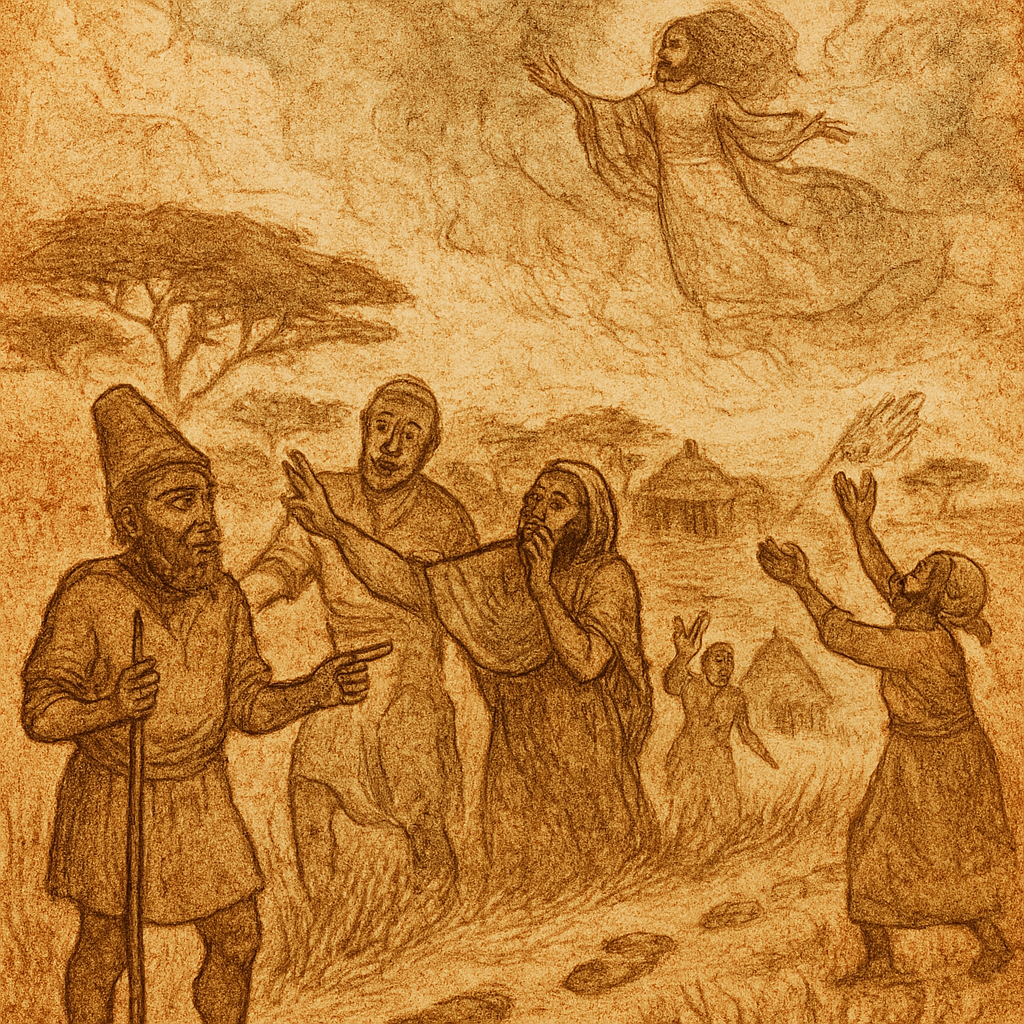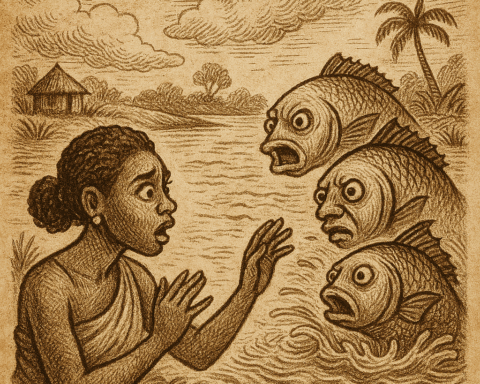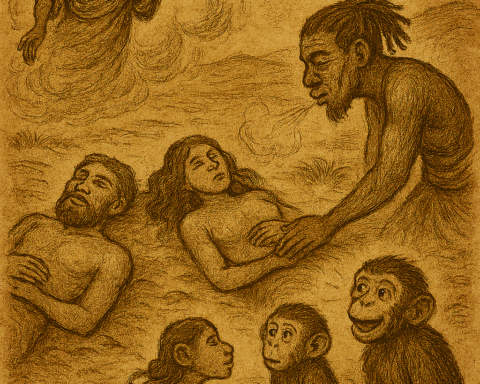In the dawn of creation, when the world was young and the boundary between heaven and earth was as thin as a whisper, the great goddess Mawu walked among mortals as easily as a mother tends to her children in their own courtyard. The sky hung so low above the earth that one could almost reach up and touch the heavens with outstretched fingertips, no more than two meters separated the divine realm from the world of humans.
In those ancient days, Mawu had entrusted all earthly responsibilities to her most cunning and capable servant, Legba, the divine messenger and guardian of crossroads. Legba was tasked with carrying out every divine command, serving as the bridge between the sacred and the mundane, the celestial and the terrestrial. His role was both honored and burdensome, for he bore the weight of executing all of Mawu’s will upon the earth.
But humanity, in their limited understanding, could not see the complexity of divine justice. When blessings flowed like sweet water from a well, when crops flourished, children were born healthy, or fortune smiled upon their endeavors, the people would lift their voices in praise, saying, “Blessed be Mawu! Our great mother has favored us!” Their hearts would swell with gratitude toward the creator goddess who dwelt so close above them.
Yet when hardship arrived like storm clouds gathering on the horizon, when drought withered their fields, sickness visited their homes, or misfortune cast its shadow over their lives, those same voices would turn sharp with blame. “It is Legba!” they would cry out in their frustration and pain. “The trickster brings us suffering! Legba is the source of our troubles!”
Day after day, season after season, this pattern continued. Legba faithfully carried out every task assigned to him by Mawu, yet he received only blame for the difficult aspects of divine will while his beloved mother received all the praise for life’s joys. The weight of this unfair burden grew heavier in Legba’s heart with each passing dawn.
One morning, as the golden light painted the low-hanging sky in shades of amber and rose, Legba’s patience finally reached its breaking point. The accumulated frustration of countless seasons of unjust blame had transformed into a burning ember of resentment within his divine heart. His clever mind, always quick to devise solutions, began to formulate a plan that would teach both Mawu and humanity a lesson they would never forget.
“Since the people insist on blaming me for all evil,” Legba declared to himself, his voice carrying the dangerous edge of wounded pride, “let me show them what true trickery looks like. Let me deceive my own mother, so that she too may taste the bitter fruit of false accusation.”
Under the cover of early morning mist, when the world was still wrapped in the quiet embrace of dawn, Legba made his way to Mawu’s sacred garden. This was a place of divine beauty, where the most precious yams grew in neat rows, their leaves catching the first rays of sunlight like emerald jewels. These were not ordinary tubers, but sacred sustenance meant to nourish the spiritual connection between heaven and earth.
With the stealth that only a divine trickster could possess, Legba carefully harvested several of the finest yams from his mother’s garden. But his cunning did not stop there, for what good would theft be without the perfect deception to accompany it? Using his supernatural abilities, Legba crafted perfect impressions of Mawu’s own footprints in the soft earth around the plundered plants, making it appear as though the great goddess herself had been the thief in her own garden.
When the morning sun climbed higher and the people came to tend to their daily tasks, they discovered the theft immediately. The missing yams were obvious, but more shocking still were the divine footprints pressed clearly into the earth, footprints they recognized as belonging to none other than Mawu herself.
Whispers spread through the community like wildfire. “Look!” they gasped, pointing at the telltale marks. “These are the footprints of our mother Mawu! It is she who has stolen the sacred yams from her own garden!”
The accusation reached Mawu’s ears like a thunderclap in a clear sky. Never in all her existence had she faced such a moment, to be accused of theft by her own children, the very beings she had lovingly created and nurtured. The shame burned in her divine heart like a flame, not because the accusation was true, but because it revealed how quickly her children’s trust could turn to suspicion.
“How can this be?” Mawu lamented, her voice heavy with sorrow and wounded pride. “I, who am their mother and creator, am now blamed for theft among my own children! What manner of gratitude is this for all my love and care?”
The injustice of the situation, compounded by the pain of betrayal from those she cherished most, kindled a righteous anger in Mawu’s heart. If her children could so easily believe evil of her, if they showed such little faith in her character, then perhaps she had been too close, too available, too familiar. Maybe distance would restore the proper respect that seemed to have been lost in their intimate relationship.
In her divine displeasure, Mawu made a momentous decision that would forever change the relationship between heaven and earth. She gathered her celestial robes around her like storm clouds and began to ascend, pulling the sky higher and farther from the world below. No longer would she dwell so near to those who could doubt her so readily.
But even this withdrawal might have been temporary, a brief lesson in divine distance, had not human carelessness sealed their fate permanently. In those days when the sky still hung relatively low, perhaps only a few meters above the earth, daily life continued much as before. Women still ground their grain in wooden mortars, lifting their pestles high to crush the kernels into flour.
One particular day, an elderly woman was engaged in this very task, preparing food for her family with the rhythmic pounding that had marked domestic life for generations. The repetitive motion of her pestle struck against the lowered sky with each downward thrust, creating a steady drumbeat against the heavens. But this was not the worst of her offenses against divine dignity.
When her work was finished, the old woman thoughtlessly gathered up the dirty water she had used for washing and the refuse from her food preparation. Without considering the sacred nature of the space above her head, the very realm where Mawu had retreated, she carelessly threw the waste upward, allowing the dirty water and scraps to splash against the divine dwelling place.
This final act of disrespect was more than Mawu could bear. The casual irreverence, the thoughtless contamination of her sacred space, confirmed her worst fears about humanity’s lack of proper reverence. Her voice rang out across the cosmos with divine indignation: “Men are without respect! They treat the sacred as common, the holy as profane!”
In that moment of righteous fury, Mawu made her final retreat. She pulled the sky higher and higher, stretching the distance between heaven and earth until it became the vast expanse we know today. No longer would mortals accidentally strike the heavens with their pestles. No longer would careless waste reach the divine realm. But also, no longer would direct communication between creator and created be possible.
As the sky receded into the unreachable distance, Mawu became a remote presence, still loving, still powerful, but no longer accessible through simple conversation or casual interaction. The intimate relationship between divine mother and human children had been severed by trickery, false accusation, and ultimate disrespect.
Only Legba remained close to humanity, for he had been left behind to continue his role as divine messenger. His trickery had succeeded beyond his wildest imagination, but perhaps not in the way he had originally intended. He had wanted to shift blame from himself to his mother, and in that he had succeeded. But in doing so, he had fundamentally altered the cosmic order.
From that day forward, whenever humans wished to communicate with the divine realm, they could no longer speak directly to Mawu as they once had. The great goddess had withdrawn to the unreachable heights of the sky, beyond the scope of ordinary human voice or gesture. Instead, all prayers, all requests, all communication with the divine had to pass through Legba first.
Thus, Legba became not just a messenger, but the essential gatekeeper between worlds, the only bridge across the vast distance his own trickery had created. And so it remains to this day: those who seek to speak with the gods must first address Legba, for he alone has maintained his position between the far-distant heaven and the earth below.
Moral Lesson
This powerful creation myth teaches us about the unintended consequences of our actions and the importance of respect in relationships. Legba’s attempt to shift blame through deception ultimately created a permanent barrier between humanity and the divine. The story warns against both false accusations and disrespectful behavior, showing how seemingly small acts of irreverence can lead to the loss of precious closeness with the sacred. It reminds us that trickery may achieve immediate goals but often comes at a cost far greater than anticipated.
Knowledge Check
Q1: Who are the main characters in this West African creation myth? A: The main characters are Mawu (the creator goddess), Legba (the divine trickster and messenger), and the human community. Mawu represents divine authority, Legba serves as intermediary, and humans represent those who must learn proper respect for the sacred.
Q2: What was Legba’s original role before his act of trickery? A: Legba was charged by Mawu with all earthly tasks, serving as the divine messenger and executor of her will. He was responsible for carrying out both blessings and hardships, but humans blamed him for evil while crediting Mawu for good.
Q3: How did Legba trick Mawu and what was his motivation? A: Frustrated by always receiving blame for hardships, Legba stole yams from Mawu’s garden and left her footprints at the scene. His motivation was to show that Mawu could also be falsely accused, hoping to teach both her and humanity about unfair blame.
Q4: What does the low sky symbolize in this West African folktale? A: The low sky (originally only two meters high) symbolizes the close, intimate relationship between the divine and human worlds. When Mawu raised it beyond reach, it represents the loss of direct communication and closeness with the divine due to human disrespect.
Q5: Why did Mawu permanently withdraw to the distant sky? A: Mawu first withdrew due to shame from false accusations of theft, but she permanently distanced herself after an old woman showed disrespect by throwing dirty water and refuse toward her dwelling place, demonstrating humanity’s lack of reverence for the sacred.
Q6: What is the cultural significance of Legba’s role as gatekeeper in this myth? A: This myth explains why in West African spiritual tradition, prayers and communications with other deities must first go through Legba. As the only divine being who remained close to earth, he became the essential intermediary between humans and the now-distant divine realm.






